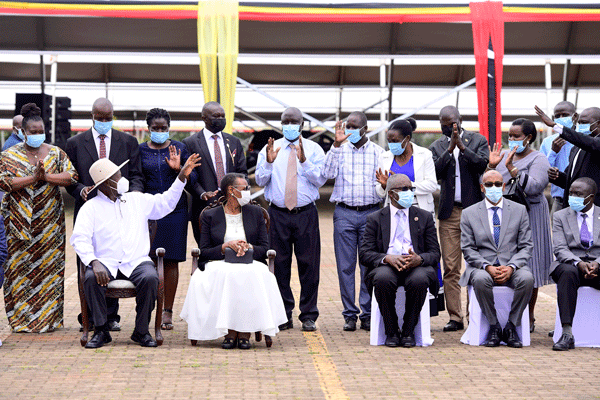Govt sets deadline for teachers to register

President Museveni (left, seated) and Minister of Education and Sports, also First Lady Janet Museveni (centre, seated), with teachers’ leaders during the National Teachers’ Day celebrations at Kololo Independence Grounds in Kampala on October 5, last year. PHOTO/FILE
What you need to know:
- The teachers’ online registration was initiated more than five years ago, but has suffered a slow uptake as many of the teachers did not enter their academic qualifications.
The Ministry of Education and Sports has directed both government and private education institutions to register all their teachers on the Education Management Information Systems (EMIS) by April 15.
The ministry’s permanent secretary, Ms Ketty Lamaro, in a letter issued on Monday, said all heads of education institutions and teachers who would not have registered on the Teachers Management Information System (TMIS) by the due date would be barred from teaching.
Ms Lamaro said the purpose of the communication is to: “Remind you that no person shall teach in any public or private school of any description unless he or she is registered as a teacher or licensed to teach in accordance with Section 11 of the Education Act.”
“You should, therefore, ensure that all your teachers are registered in the TMIS portal by 15th April 2024.”
The ministry says both TMIS and EMIS are intended to weed out unqualified persons in the education sector, ghost workers, as well as improve educational standards.
The teachers’ online registration was initiated more than five years ago, but has suffered a slow uptake as many of the teachers did not enter their academic qualifications into the system.
The State Minister of Higher Education, Mr John Chrysostom Muyingo, yesterday said the registration is in line with the ministry’s plans of digitalising the education sector.
“We first want to know the total number of teachers in this country. We need their database to enable us plan for them effectively. Remember government plans to increase salaries of teachers, so we need to know who they are and where they are,” he said.
“We want to digitise the education sector to wipe out ghost teachers who are receiving taxpayers’ money. All this will be known by just the click of a button. We are late because this was needed yesterday,” he added.
The personnel that register in the education system must include their national identification number (NIN), which makes it difficult to have double registration.
In the EMIS, the education institution registers the number of learners they have, teaching and non-teaching staff, its infrastructure and the items it would wish to be supported in.
Ms Lamaro said they would use the EMIS to determine the number of government education institutions to benefit from the payment of grants.
Ms Lamaro also tasked “all government institutions to upload (details of) their teaching and non-teaching staff (including those not on government payroll) on the EMIS portal by 15th April 2024.”
She said: “Failure to abide by this deadline is likely to delay payment of April salaries.”
The permanent secretary urged the private education institutions to do the same by the end of the first term of this academic year.
But the Secretary General of the Uganda National Teachers Union (Unatu), Filbert Baguma, who welcomed the idea, said the deadline provided is unrealistic and rather short. He said teachers will storm the system and slow it down, yet they won’t also be teaching. He said three months would be ideal for the exercise.
However, Mr Muyingo said: “I appreciate the challenge of the internet, but that should not mean we should do things reluctantly. I understand most teachers have smartphones that can be used to access the system easily.”
Relatedly, the chairperson of the National Private Education Institution Association (NPEIA), Mr Hasadu Kirabira, said the teachers are worried whether the registration will be free of charge.
“If the Ministry of Education issues deadlines and the information does not reach the schools, we shall not beat the deadline,” he said.
“We need to know if teachers are going to register with a fee or not because many are worried that for a teacher who gets little money to pay a registration fee is untenable,” Mr Kirabira said.
The Outgoing Chairperson of Head Teachers Association in Uganda, Mr Augustine Mugabo, attributed the delays to lack of digital skills to handle registration by most schools, especially those in rural areas.
“Headteachers are not taking the exercise seriously and it is high time they did the needful,” he said.
“The lack of digital skills has also posed another challenge even among those with the capacity to register, causing the delays. I encourage teachers to stick to the deadline for easy planning for teachers by the government,” Mr Mugabo said.
Government has since 2019 registered more than 200,000 teachers using the same system, but some are having fake academic documents or are unfit to work in education facilities. It has also been able to detect ghost workers on the payroll.
Mr Muyingo said since Uganda is exporting labour, including teachers of English, their registration is vital for ease of locating them while abroad.
Government data shows that there are 24,173 pre-primary schools, 49,124 primary schools, 8,392 secondary schools, 1444 certificate institutions, 109 diploma institutions, and 55 degree institutions in the country.




